Difference between revisions of "Poems on Witty Subjects in Congress"
(→"For Farms in Utopia, the Moon, or Some Fairyland," by George Wythe) |
|||
| Line 75: | Line 75: | ||
{| | {| | ||
| style="width: 500px; white-space: nowrap; margin: 20px 0 20px 20px; background-color: #f9f7e0; border: 1px solid #000000; padding: 20px 50px;" | | | style="width: 500px; white-space: nowrap; margin: 20px 0 20px 20px; background-color: #f9f7e0; border: 1px solid #000000; padding: 20px 50px;" | | ||
| − | For farms in | + | For farms in eutopia, the moon, or some fairyland<br /> |
Compensations more worth were offered by Maryland.<br /> | Compensations more worth were offered by Maryland.<br /> | ||
| − | In this it's denied our sister's cross | + | In this it's denied, Sir, our sister's cross humour'd,<br /> |
| − | Whatever by juntos or patriots be | + | Whatever by juntos or patriots be rumour'd.<br /> |
Her brave men must fight, bleed, and suffer as others,<br /> | Her brave men must fight, bleed, and suffer as others,<br /> | ||
| − | Leave orphans their dear babes and childless their mothers,<br /> | + | Leave orphans their dear babes, and childless their mothers,<br /> |
Give full many a fair Penelope heartaches,<br /> | Give full many a fair Penelope heartaches,<br /> | ||
Whilst their country of their virtuous earnings partakes<br /> | Whilst their country of their virtuous earnings partakes<br /> | ||
A very small pittance. Why this noise and stir then,<br /> | A very small pittance. Why this noise and stir then,<br /> | ||
| − | If, lest her shoulders bear too much of the | + | If, lest her shoulders bear too much of the burthen,<br /> |
She reject your unequal mode of taxation,<br /> | She reject your unequal mode of taxation,<br /> | ||
Demonstrate by numbers, without relaxation,<br /> | Demonstrate by numbers, without relaxation,<br /> | ||
That ruin is doom'd her, and cries in distraction<br /> | That ruin is doom'd her, and cries in distraction<br /> | ||
| − | She'll yield to the | + | She'll yield to the old, not the new-english faction?<br /> |
With candor attend to her efflagitation,<br /> | With candor attend to her efflagitation,<br /> | ||
And these two demands grant without hesitation.<br /> | And these two demands grant without hesitation.<br /> | ||
| − | Virginia must feel for any | + | Virginia must feel for any neighbour oppress'd,<br /> |
Cannot easy remain til the mischief's suppress'd; | Cannot easy remain til the mischief's suppress'd; | ||
<center>And</center> | <center>And</center> | ||
| Line 100: | Line 100: | ||
| style="width: 500px; white-space: nowrap; margin: 20px 0 20px 20px; background-color: #f9f7e0; border: 1px solid #000000; padding: 20px 50px;" | | | style="width: 500px; white-space: nowrap; margin: 20px 0 20px 20px; background-color: #f9f7e0; border: 1px solid #000000; padding: 20px 50px;" | | ||
And if slaves you include in your capitation,<br /> | And if slaves you include in your capitation,<br /> | ||
| − | Is equally injur'd | + | Is equally injur'd—claims like defalcation.<br /> |
E'en while, it is true, we're somewhat contrarient,<br /> | E'en while, it is true, we're somewhat contrarient,<br /> | ||
Yet interest will join those of sentiments variant.<br /> | Yet interest will join those of sentiments variant.<br /> | ||
| Line 106: | Line 106: | ||
All wish for devoutly, a state independent.<br /> | All wish for devoutly, a state independent.<br /> | ||
Then cease to object to a sister we're tender,<br /> | Then cease to object to a sister we're tender,<br /> | ||
| − | Indulgent with excess | + | Indulgent with excess—unwilling to mend her,<br /> |
| − | If we | + | If we favour petitions founded on reason,<br /> |
With deference offer'd at convenient season.<br /> | With deference offer'd at convenient season.<br /> | ||
Fell discord had too long among us existed.<br /> | Fell discord had too long among us existed.<br /> | ||
| − | From our councils cashier'd, if now | + | From our councils cashier'd, if now re-enlisted,<br /> |
| − | It with | + | It with tories will league to puzzle our measures,<br /> |
And spoil us of freedom, most precious of treasures. | And spoil us of freedom, most precious of treasures. | ||
| | | | ||
Revision as of 07:41, 16 April 2014
George Wythe and Willam Ellery, "Poems on Witty Subjects in Congress," American Revolutionary War Manuscripts Collection, Boston Public Library, MS.Ch.E.8.31-33.[1]
Contents
- 1 Manuscript text, November-December 1776
- 1.1 "A Member of the Antinovanglian Faction to W. E.," by George Wythe (VA)
- 1.2 "A Novanglican to G.W.," by William Ellery (RI)
- 1.3 "Instead of Controlling Our Mary's Cross Humor," by William Ellery
- 1.4 "For Farms in Utopia, the Moon, or Some Fairyland," by George Wythe
- 1.5 "Epigram," by William Ellery
- 1.6 "Answer to Epigram," by George Wythe
- 1.7 "Unless You Will Take One Line for Your Ten," by William Ellery
- 1.8 "You've Not only Quitted Your Arrear," by George Wythe
- 1.9 "Some Mere Poetaster Call Tully," by George Wythe
- 1.10 "The Gen'rous Idea Your Last Piece Expresses," by William Ellery
- 1.11 "A Commissioner, to the People of Philadelphia," by William Ellery
- 2 See also
- 3 References
- 4 External links
Manuscript text, November-December 1776
"A Member of the Antinovanglian Faction to W. E.," by George Wythe (VA)
|
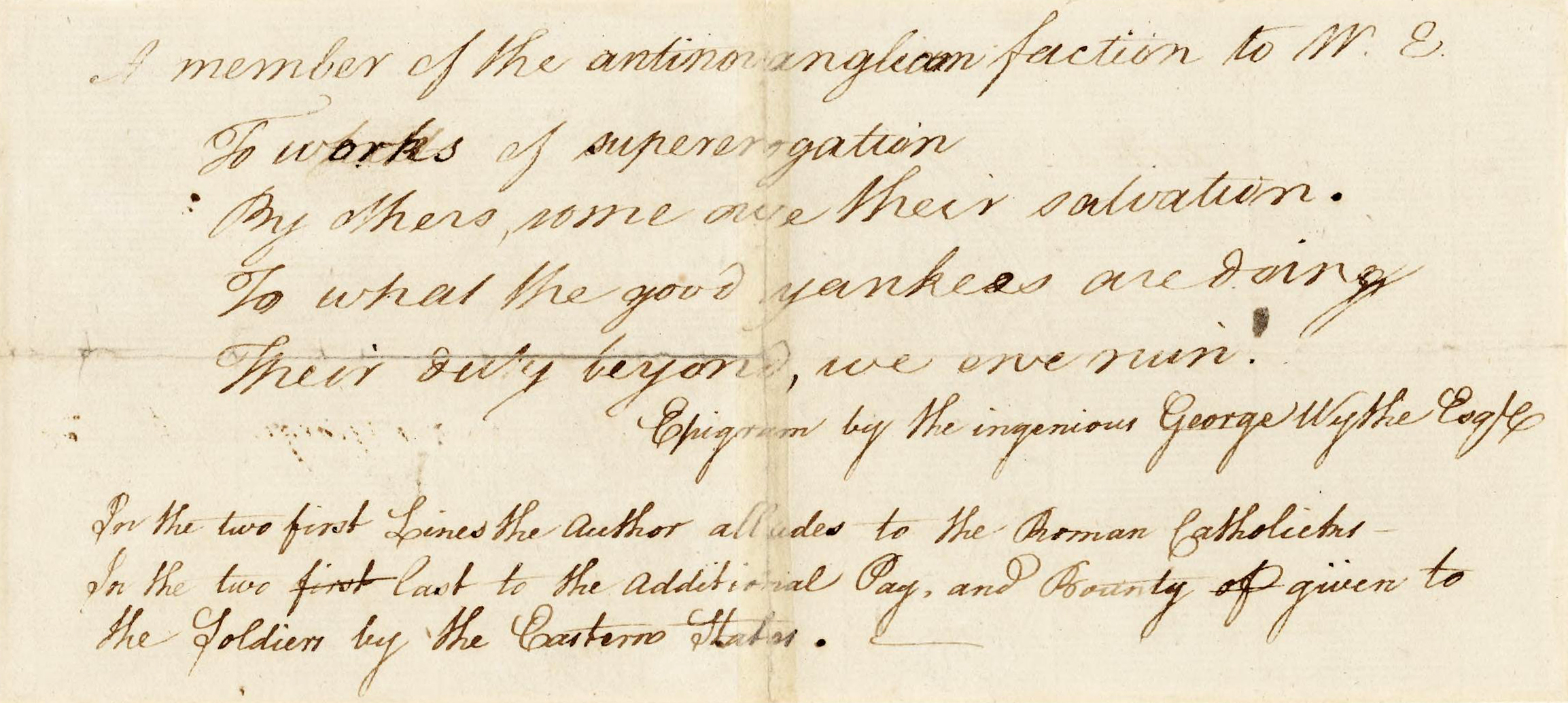 Page seven from Poems on Witty Subjects in Congress, from the Boston Public Library's American Revolutionary War Manuscripts collection. |
"A Novanglican to G.W.," by William Ellery (RI)
|
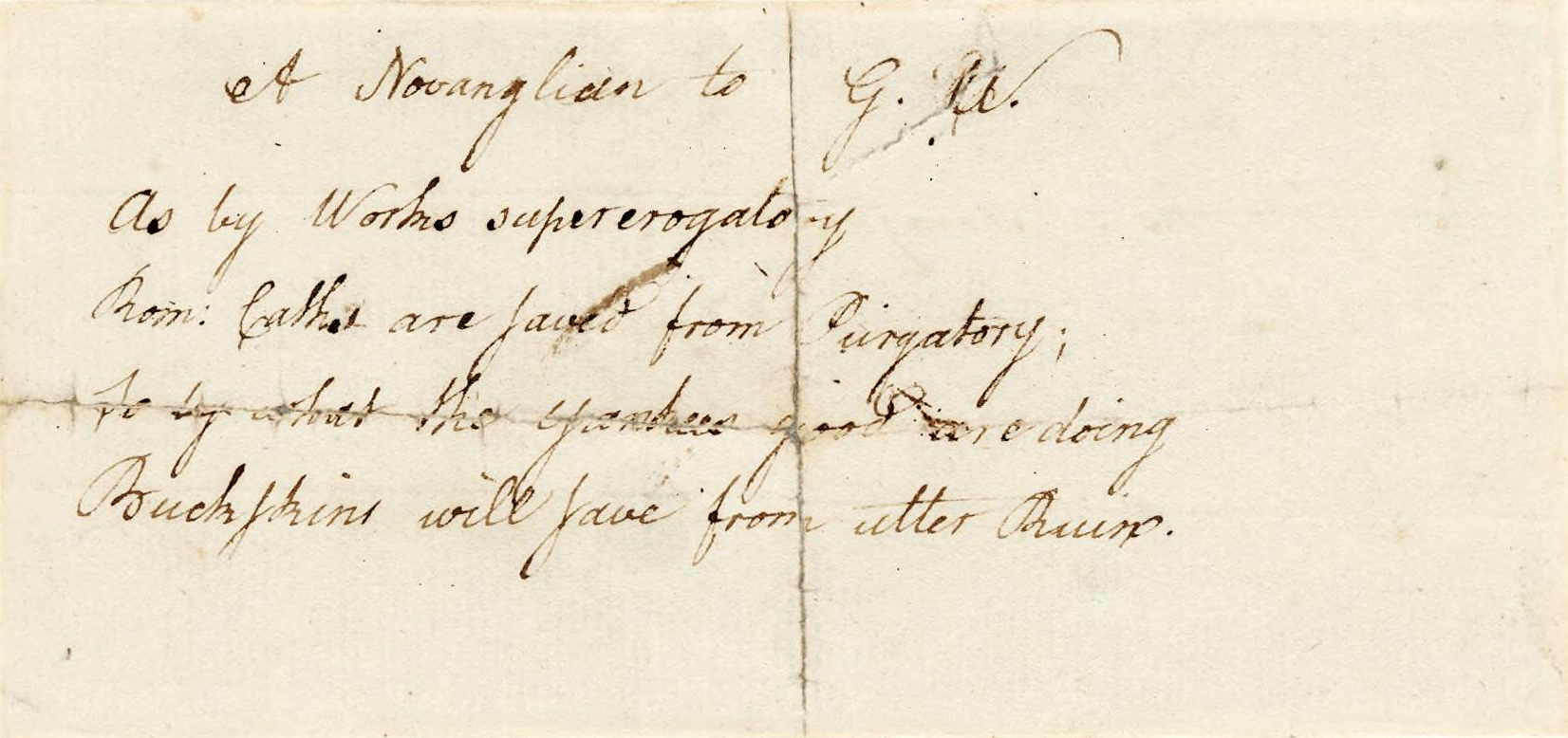 Page three from Poems on Witty Subjects in Congress, from the Boston Public Library's American Revolutionary War Manuscripts collection. |
"Instead of Controlling Our Mary's Cross Humor," by William Ellery
|
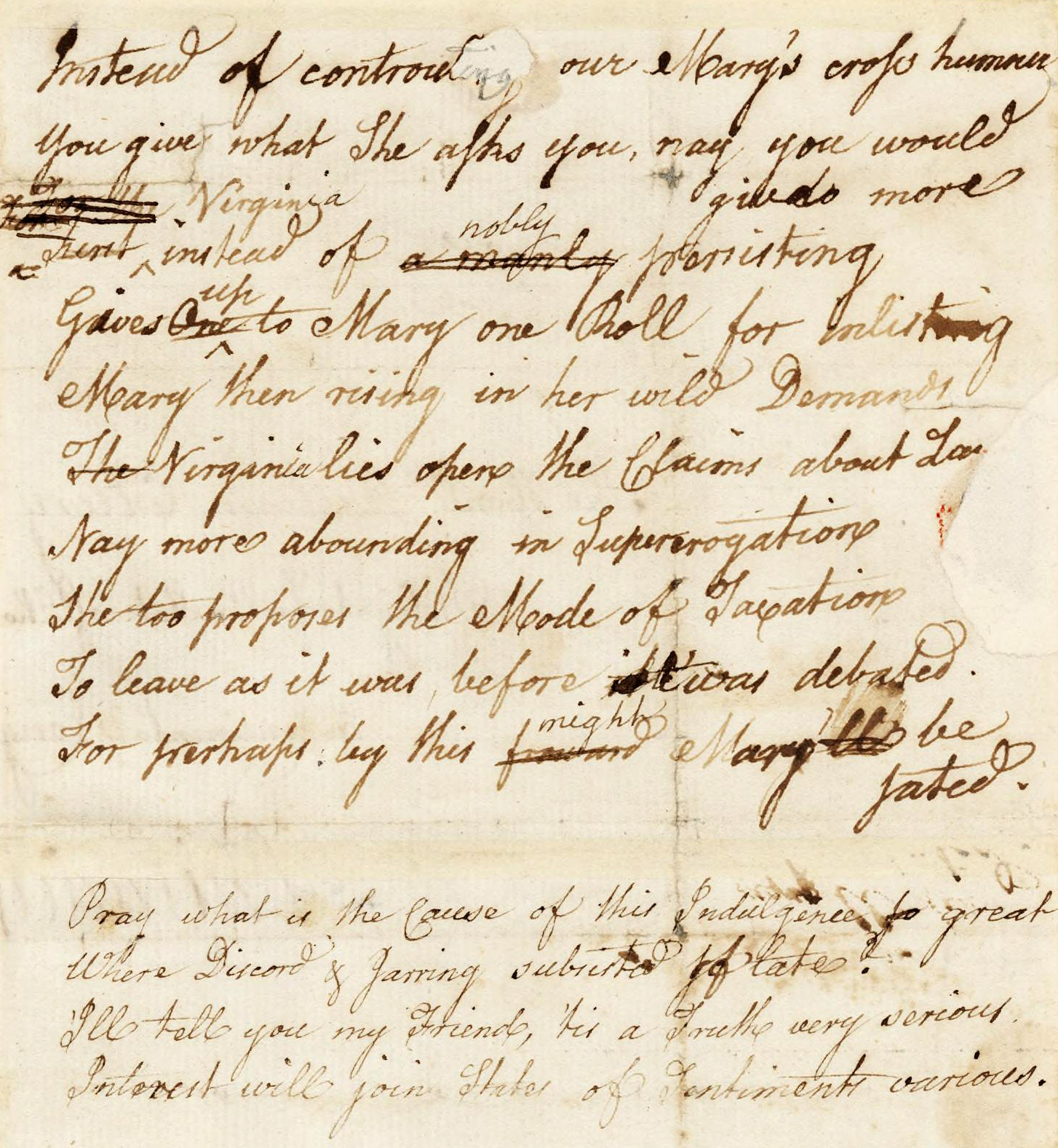 Page five from Poems on Witty Subjects in Congress, from the Boston Public Library's American Revolutionary War Manuscripts collection. |
"For Farms in Utopia, the Moon, or Some Fairyland," by George Wythe
|
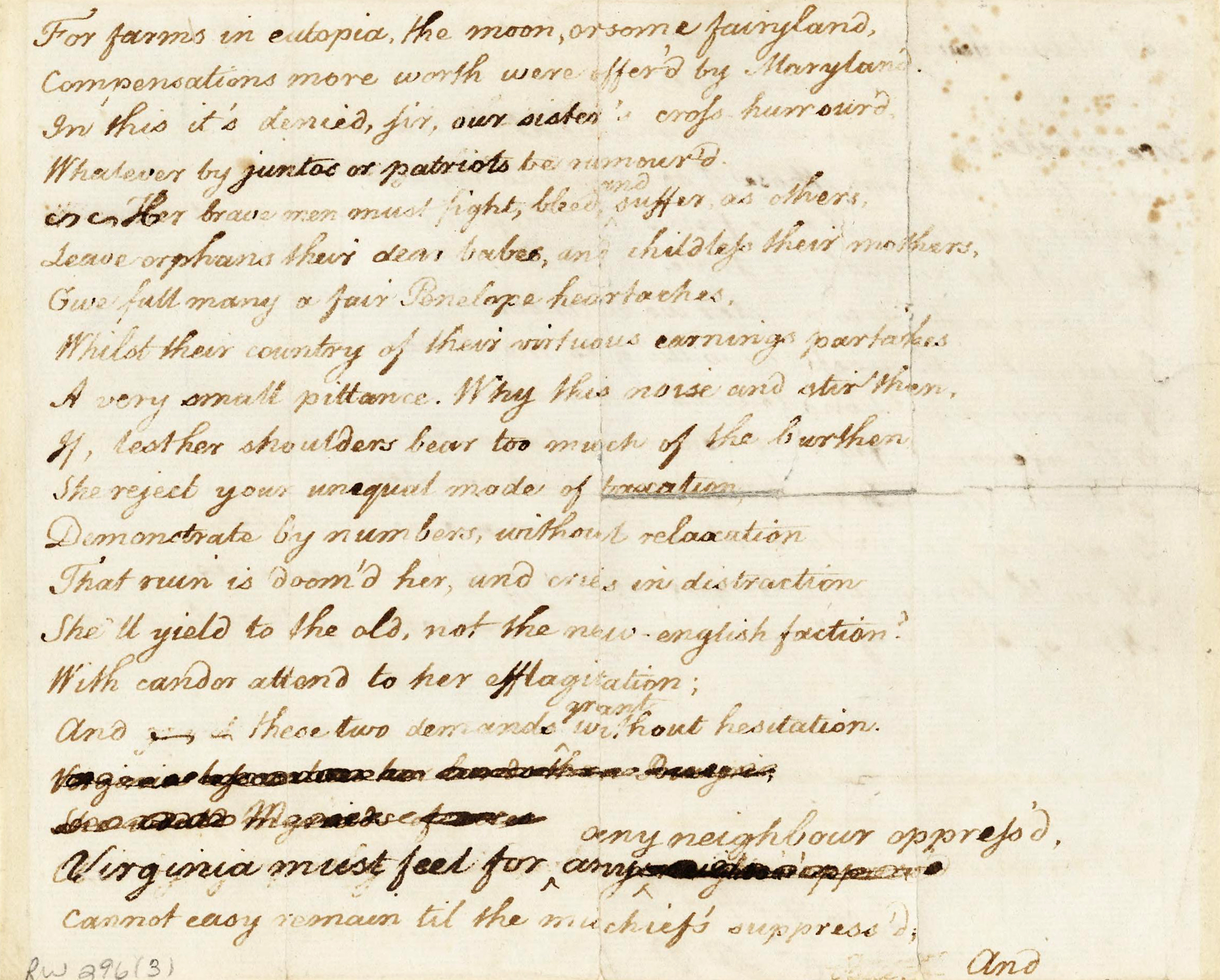 Page nine from Poems on Witty Subjects in Congress, from the Boston Public Library's American Revolutionary War Manuscripts collection. | |
|
And if slaves you include in your capitation, |
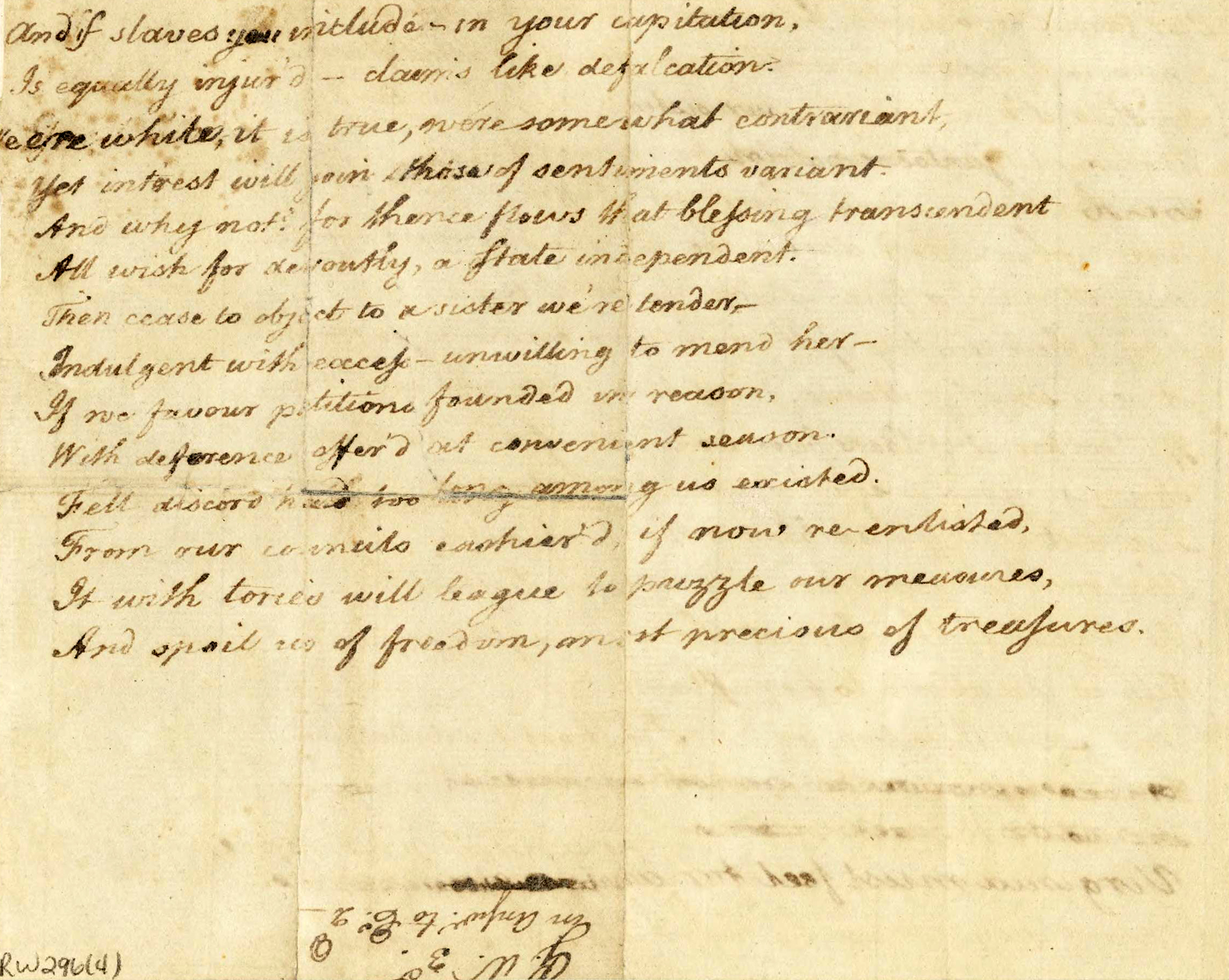 Page ten from Poems on Witty Subjects in Congress, from the Boston Public Library's American Revolutionary War Manuscripts collection. |
"Epigram," by William Ellery
|
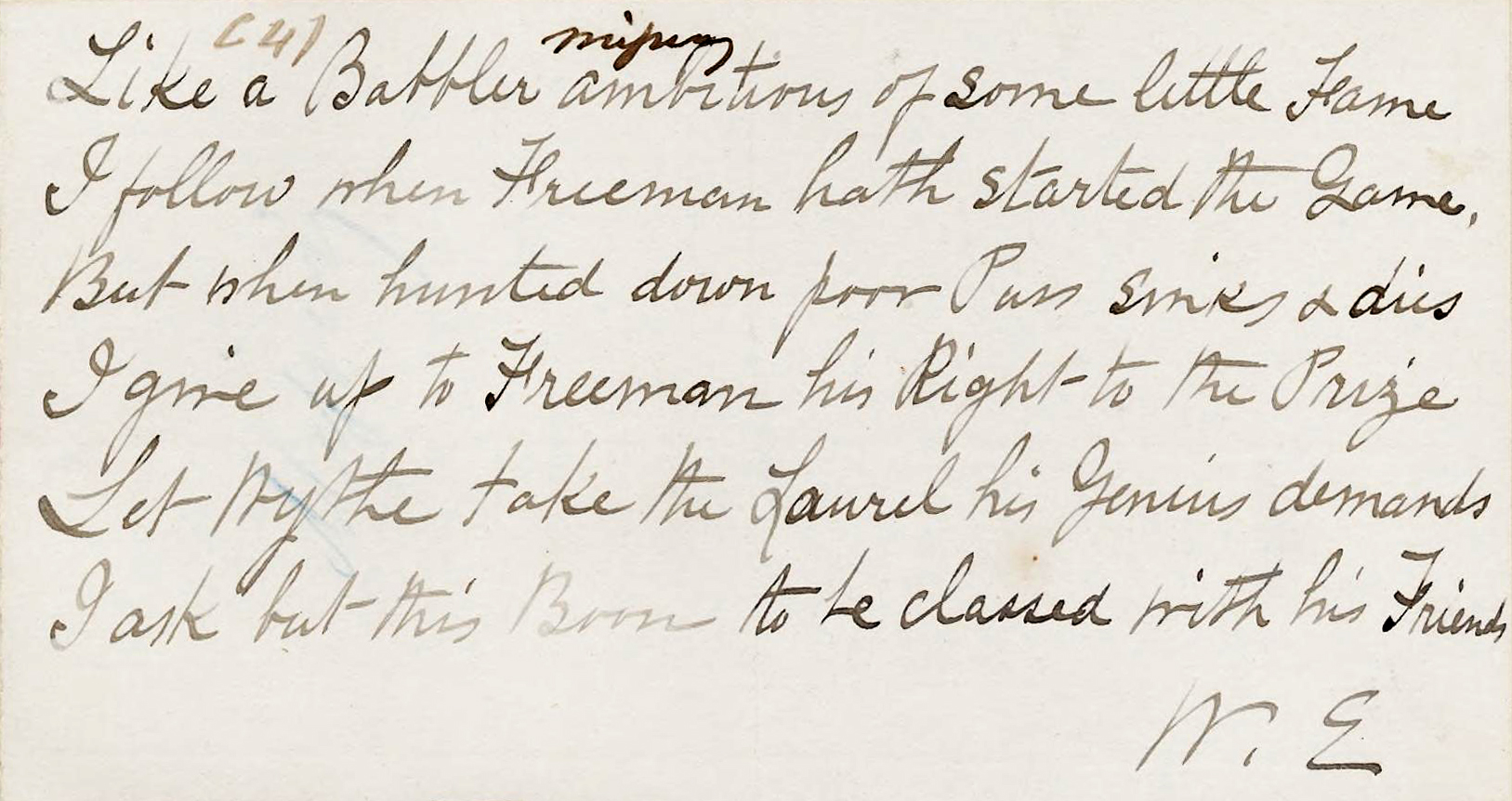 Page eleven from Poems on Witty Subjects in Congress, from the Boston Public Library's American Revolutionary War Manuscripts collection. |
"Answer to Epigram," by George Wythe
|
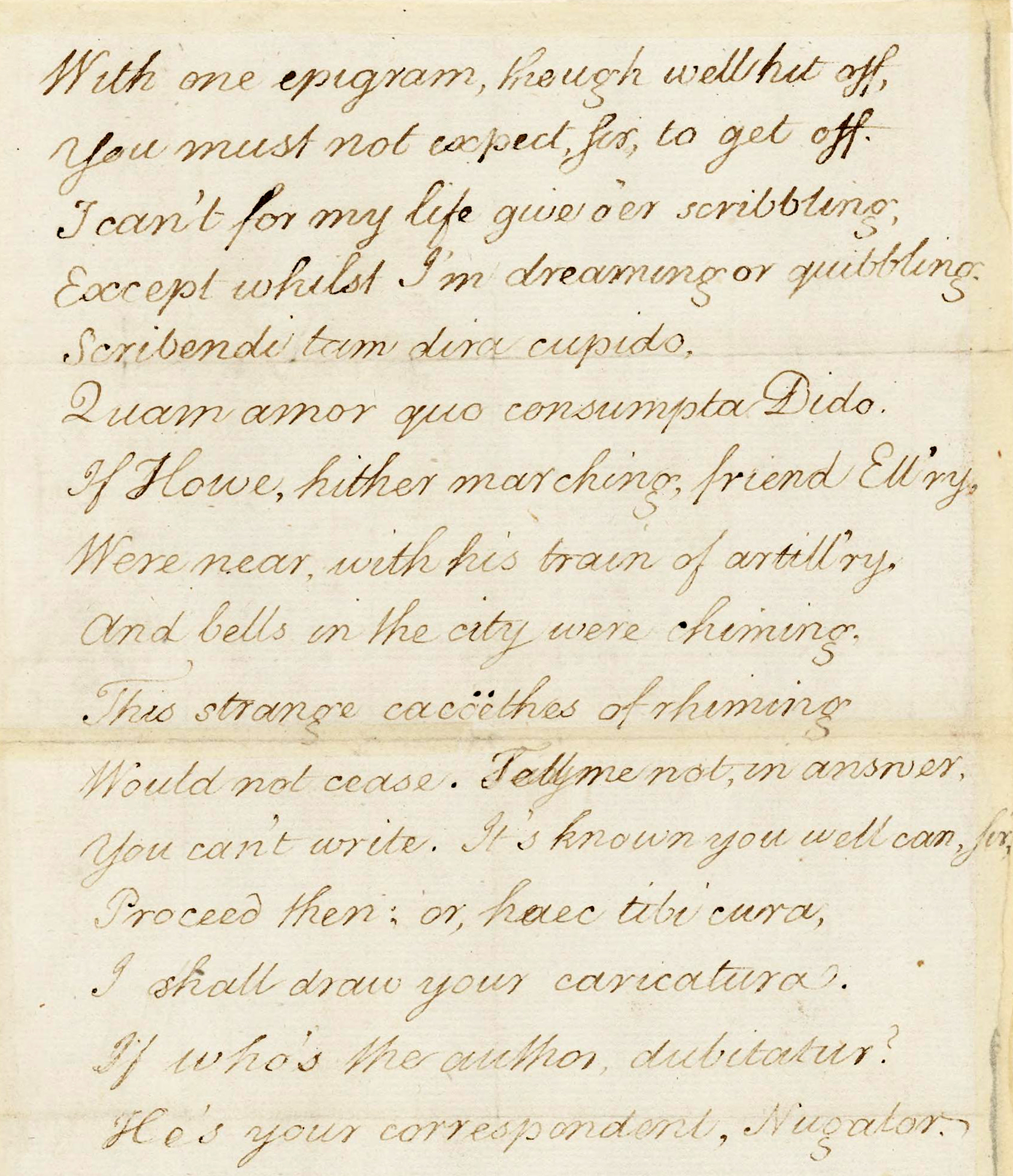 Page twenty-one from Poems on Witty Subjects in Congress, from the Boston Public Library's American Revolutionary War Manuscripts collection. |
"Unless You Will Take One Line for Your Ten," by William Ellery
|
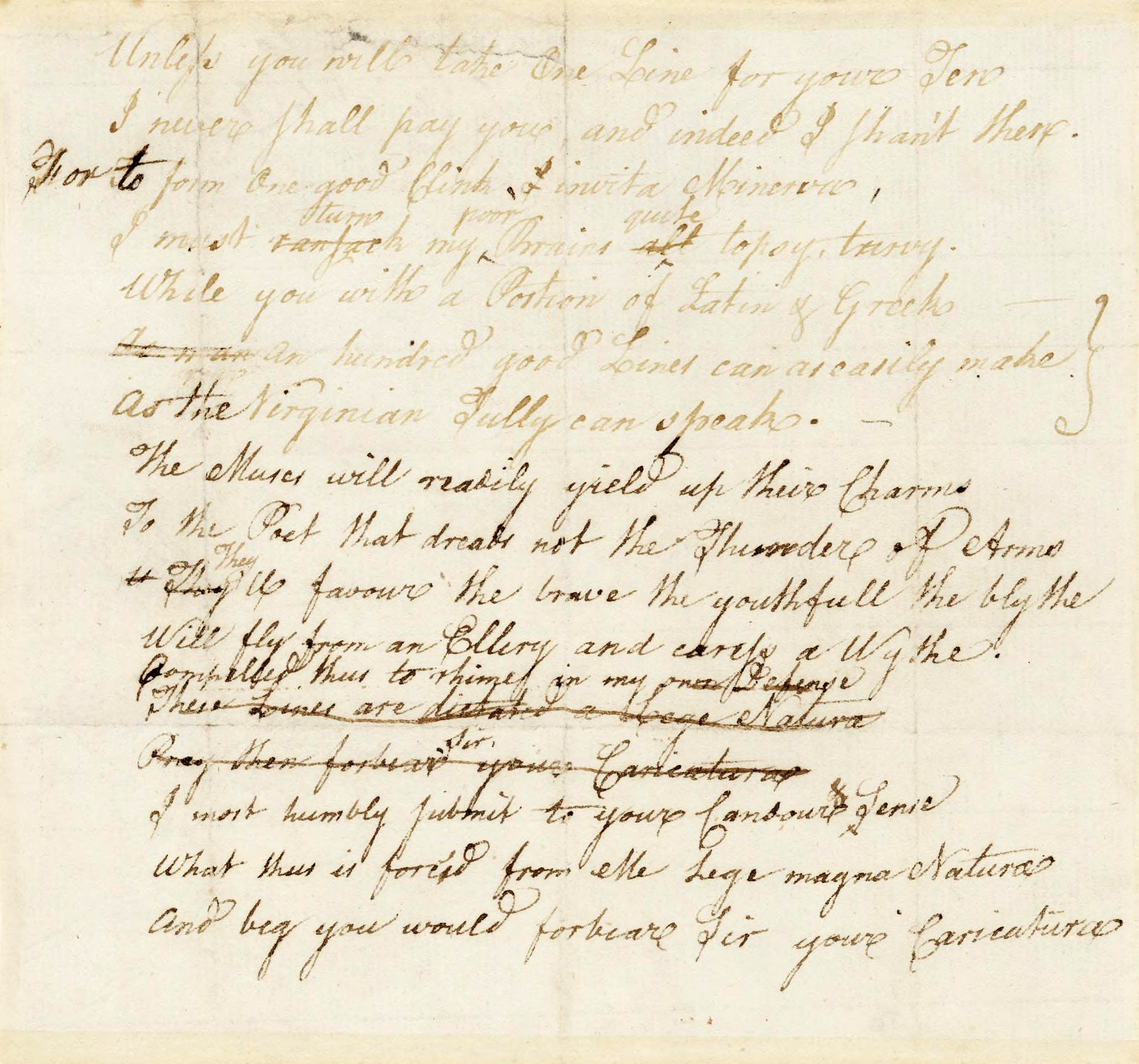 Page twenty-three from Poems on Witty Subjects in Congress, from the Boston Public Library's American Revolutionary War Manuscripts collection. |
"You've Not only Quitted Your Arrear," by George Wythe
|
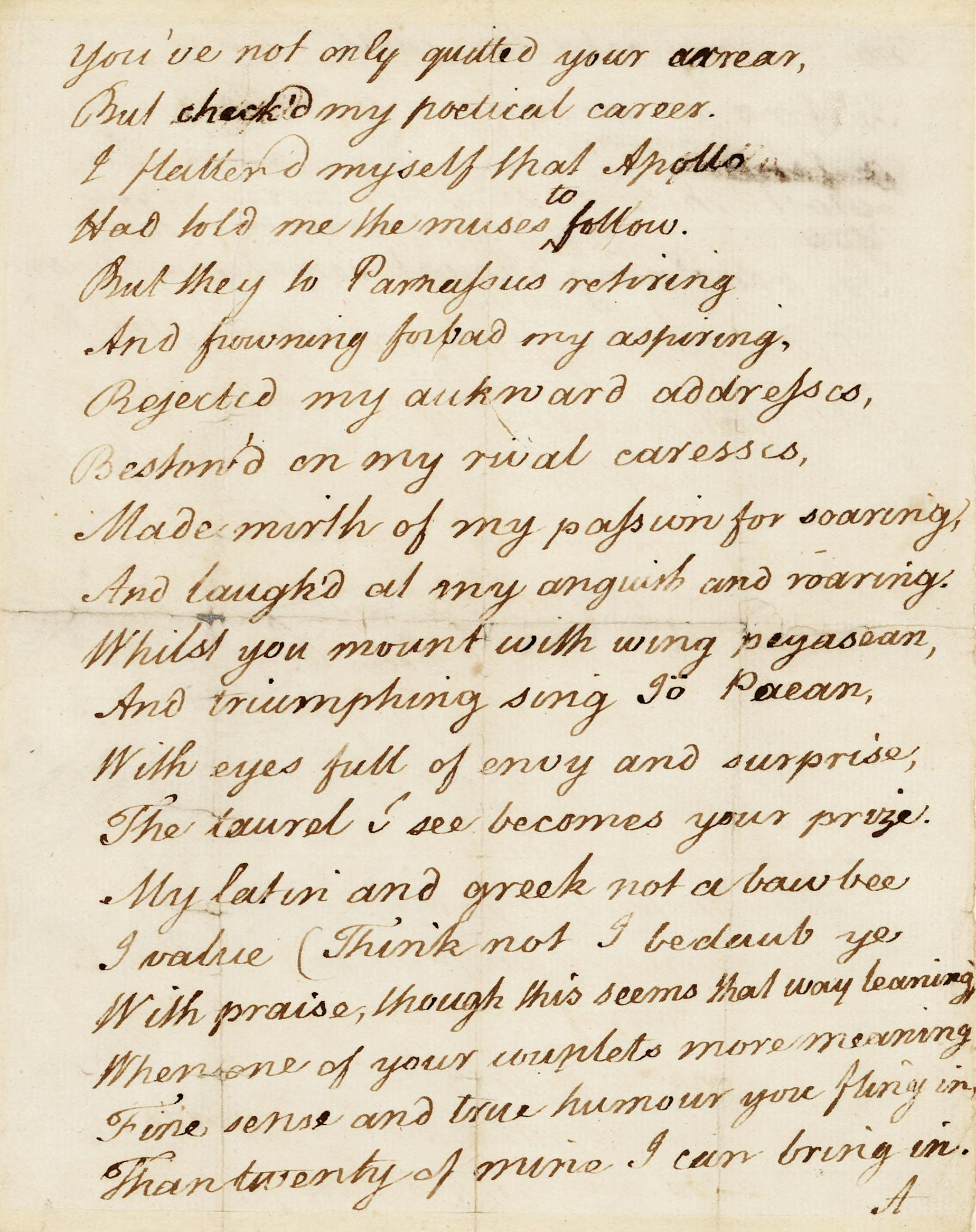 Page fifteen from Poems on Witty Subjects in Congress, from the Boston Public Library's American Revolutionary War Manuscripts collection. |
"Some Mere Poetaster Call Tully," by George Wythe
|
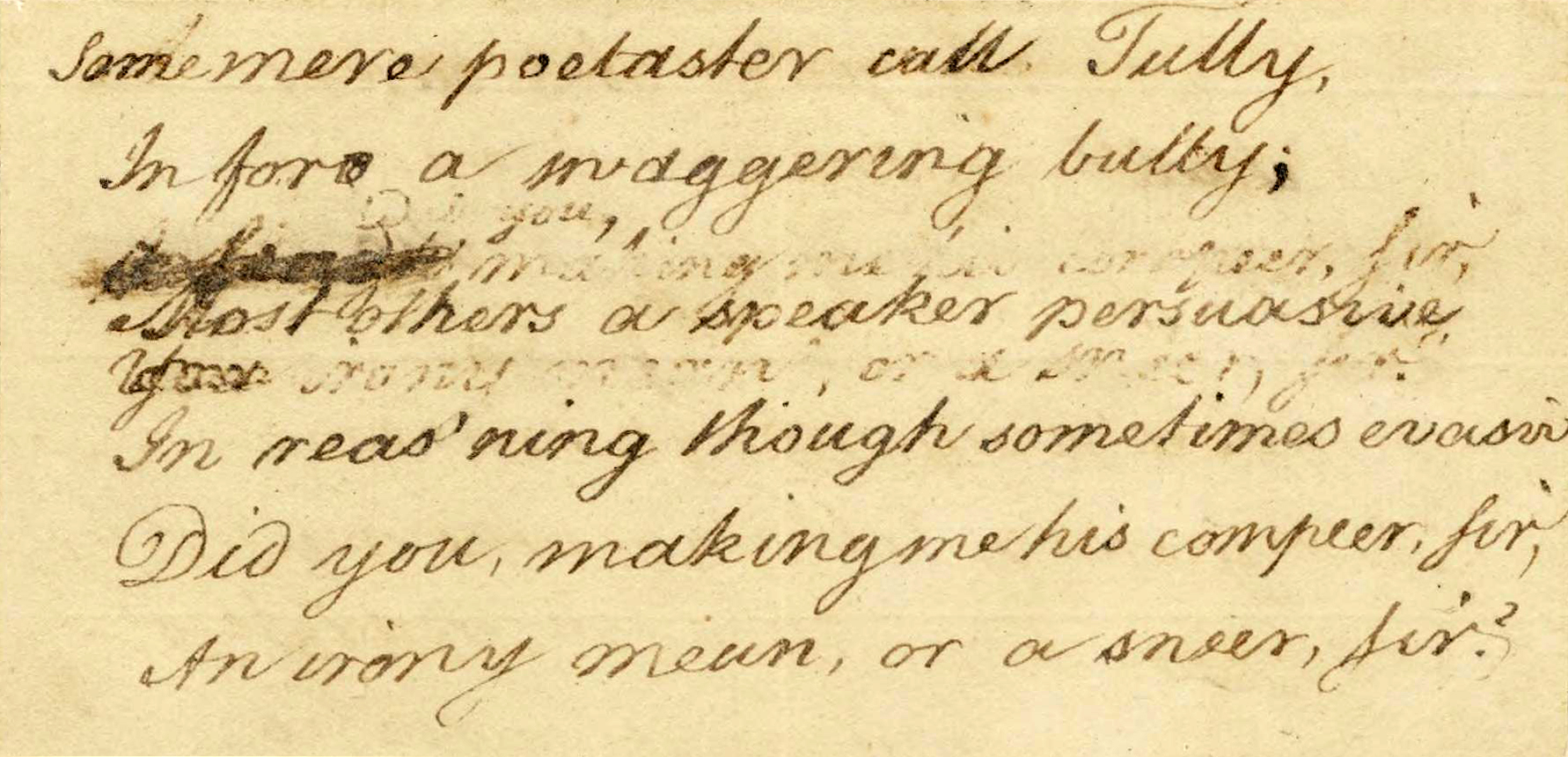 Page sixteen from Poems on Witty Subjects in Congress, from the Boston Public Library's American Revolutionary War Manuscripts collection. |
"The Gen'rous Idea Your Last Piece Expresses," by William Ellery
|
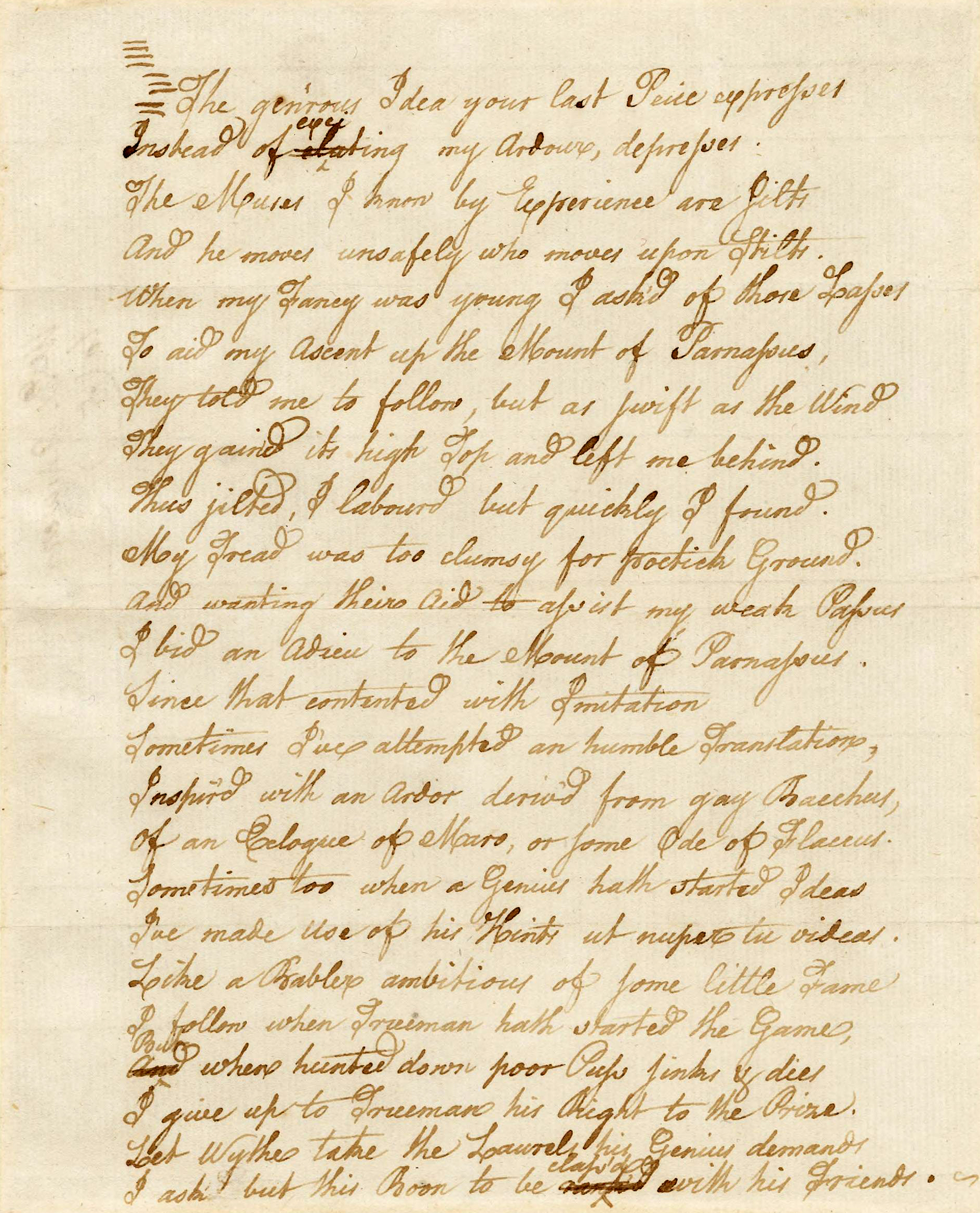 Page twenty-five from Poems on Witty Subjects in Congress, from the Boston Public Library's American Revolutionary War Manuscripts collection. |
"A Commissioner, to the People of Philadelphia," by William Ellery
In this poem, Ellery chastises the conservative position of Andrew Allen, delegate from Pennsylvania, for his commonwealth's reluctance to support independence from Great Britain. The first letter of each line spells out "ANDREW ALLEN" (emphasized here). Ellery apparently attempted to get the poem published, as there is another draft with the lines transposed to avoid obvious "libellus famosos" (libel), and a dialogue with a reluctant printer:
|
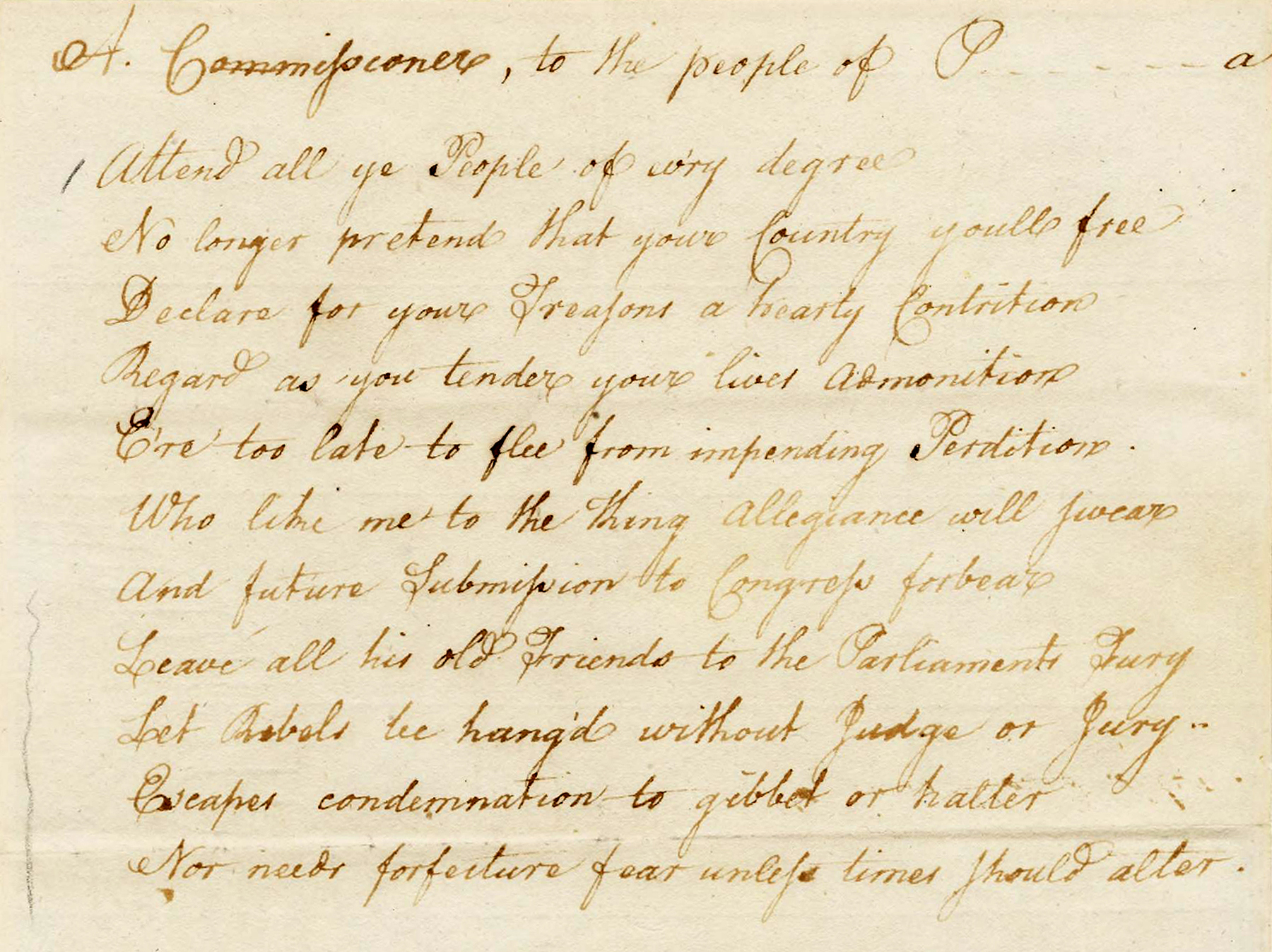 Page one from Poems on Witty Subjects in Congress, from the Boston Public Library's American Revolutionary War Manuscripts collection. |
|
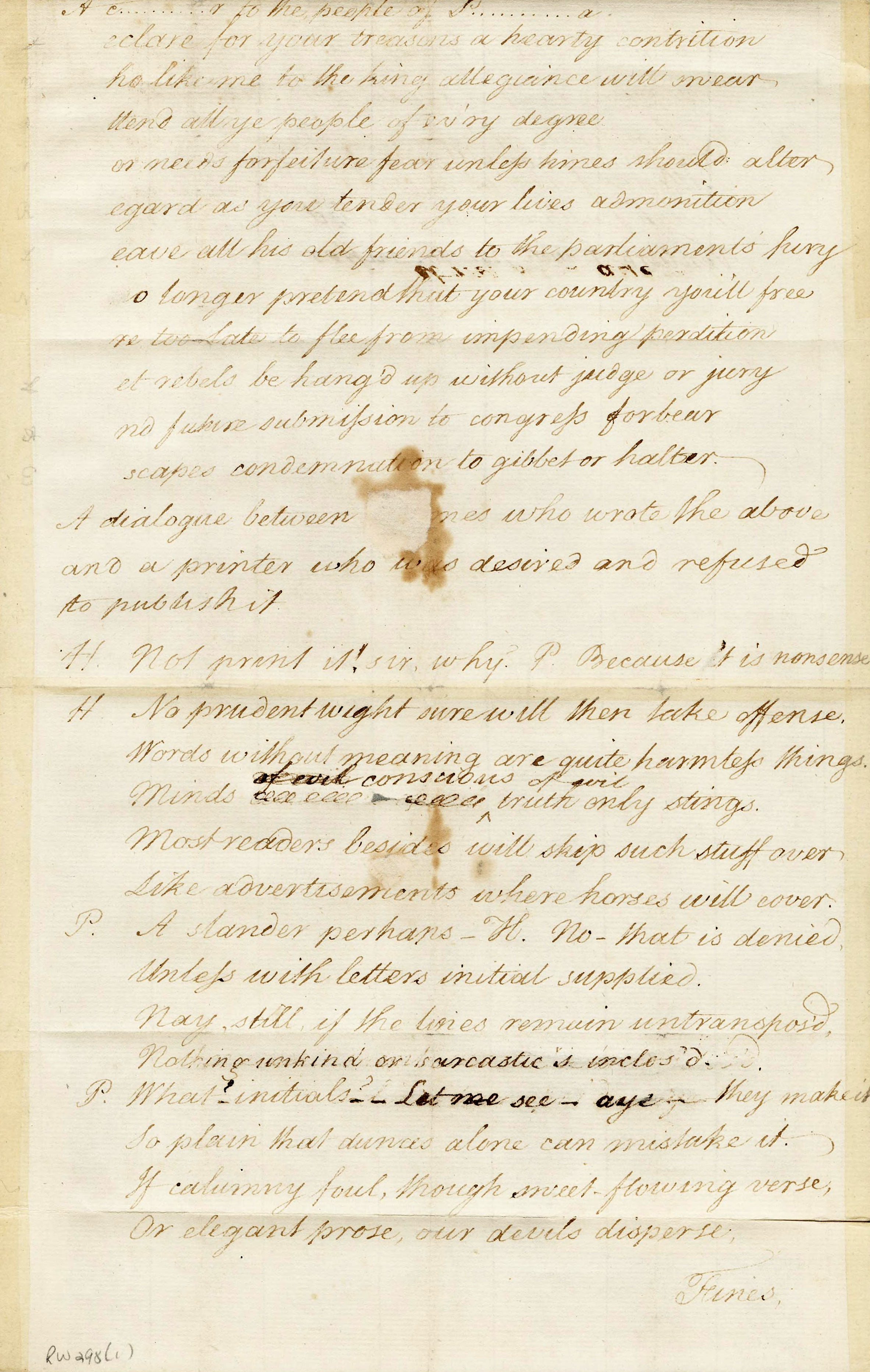 Page nineteen from Poems on Witty Subjects in Congress, from the Boston Public Library's American Revolutionary War Manuscripts collection. | |
|
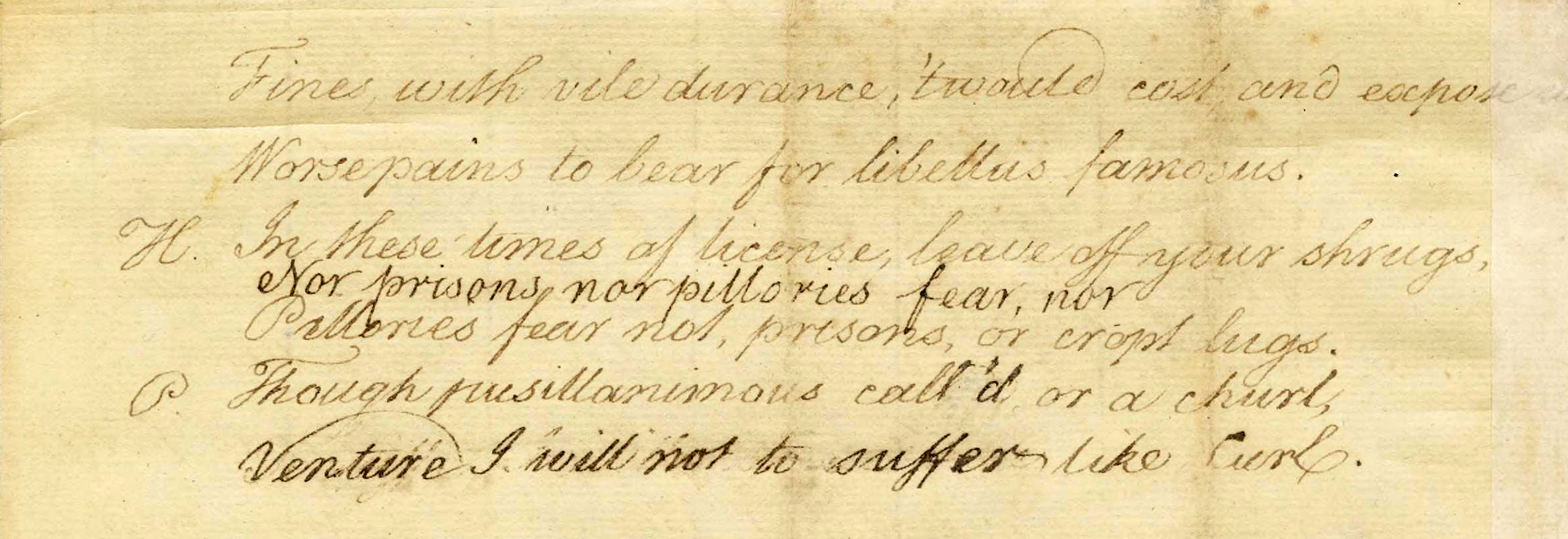 Page twenty from Poems on Witty Subjects in Congress, from the Boston Public Library's American Revolutionary War Manuscripts collection. |
See also
References
- ↑ See W. Edwin Hemphill, "George Wythe Courts the Muses," William and Mary Quarterly 3rd ser., 9, no. 3 (July 1952), 338-345.
- ↑ "Novanglian": New Englander.
- ↑ "Dire desire to write," paraphrase of Virgil, Aeneid, Book V, line 721.
- ↑ "The love which consumed Dido," Queen of Carthage.
- ↑ Ovid, Ex Ponto III, xxxvi.
- ↑ Dubitatur: "It is doubted."
- ↑ Jester, clown.
- ↑ Defy nature, literally "go against Minerva's will." Cicero, De Officiis, I, 31, 110.
- ↑ Wythe is a Virginian Cicero: Marcus Tullius Cicero.
- ↑ A great law of Nature.
- ↑ Classical Greek cry of exultation or triumph, traditionally addressed to Apollo the healer.
- ↑ Bawbee: a Scottish half-penny.
- ↑ "As of late, you see."
- ↑ Libellus famosos: libel.
- ↑ A reference to the colonial punishment of cutting off ears?
- ↑ Edmund Curll (c. 1675 – 1747), whose name was synonymous with "unscrupulous publication and publicity."
External links
- Boston Public Library, Special Collections.
- American Revolutionary War Manuscripts at the Boston Public Library, Internet Archive.
- Read these poems in the Internet Archive.